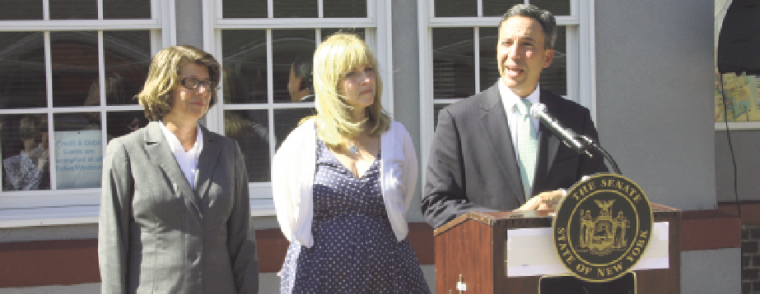Long Island Rail Road commuters will now have two months to use one-way and round-trip tickets, as the Metropolitan Transportation Authority announced last week it would change what state Sen. Jack Martins (R-Mineola) called its previous “failed policy” that made the tickets valid for two weeks.
The MTA has also extended the refund period for the tickets from one to two months, Martins said last Wednesday during a joint press conference with state Assemblywoman Michelle Schimel (D-Great Neck) and Long Island Rail Road President Helena Williams.
“It’s a positive step,” Martins said of the MTA’s revised ticket policy during the press conference at the Long Island Rail Road’s Mineola station.
“I think it’s a great recognition,” he added, “that the suburban commuter on Long Island is not the MTA’s piggy bank.”
Since the MTA’s previous policy went into effect two years ago, Martins said Long Island Rail Road commuters have been treated unfairly when compared to New York City’s subway and bus riders.
Martins said the validity period for an MTA subway or bus ticket in New York City is one year.
“Someone can take a subway ticket and carry it out for a year and renew it for another year,” Martins said. “The reality is a ticket on the Long Island Rail Road for two weeks is simply too short a period. Two months is better and we expect that working together, we can get this process moving.”
By changing its ticket policy from two weeks to two months, Martins said the MTA reverted back to its policy from two years ago.
Martins and Schimel both sponsored legislation, which the lawmakers said led the MTA to change its ticketing policy.
“I support mass transit,” Schimel said. “If anyone knows anything about me, and certainly Sen. Martins, we get it. Mass transit is the lifeblood of the metropolitan area particularly on Long Island. I want people to use the trains and the Long Island Rail Road.”
Since December of 2010, Schimel said a number of service cuts and the validity period of the tickets have made commuting on the Long Island Rail Road problematic for residents of Long Island.
“We want to send a message to the Long Island Rail Road and the MTA and they got it,” Schimel said. “They are listening. They do respect what the riders are saying.”
Although the MTA extended its ticket validity process, the transit authority did not do away with a $10 refund processing fee.
“We’re pleased that the cost containment efforts of our commuter railroads, combined with increased ridership, make it possible to broaden our ticket validity and refund policies to further benefit Long Island Rail Road and Metro North customers,” MTA Chairman Joseph Lhota said.
Reversing its ticket policy will cost the MTA $6 million a year, Lhota said.
Martins and Schimel included the repeal of the $10 processing fee in their legislation, but the MTA did not do away with the charge.
“There is a cost for us to do processing,” Williams said. “But, as the senator said, and the assemblywoman said, we’re going to watch that.”
Williams said it is the belief of MTA and Long Island Rail Road officials that the refund fee will not have as much of an effect on riders moving forward.
“People will be able to use the ticket during the new extended validity period,” Williams said. “Today, again, we are excited about the good news.”
The MTA board also recently approved $29.5 million in service investments that will increase service on several of the Long Island Rail Road branches, Williams said.
“Senator, assemblywoman, your voices were heard,” the LIRR president said. “We were able to respond.”
In the upcoming year, Martins and Schimel said they would continue to push legislation to eliminate the MTA’s $10 processing fee.
With the MTA’s $14-billion budget, Martins said eliminating the $10 processing fee would mean a loss of “1/20 of 1 percent or the equivalent of somebody who makes $100,000 paying $50 bucks.”
“If you consider it simply from an equity standpoint from a fairness standpoint, we’re taking about $6 million, $6 million of money that people have already paid,” Martins said. “This isn’t money that the MTA has earned. It isn’t money that they should keep.”



